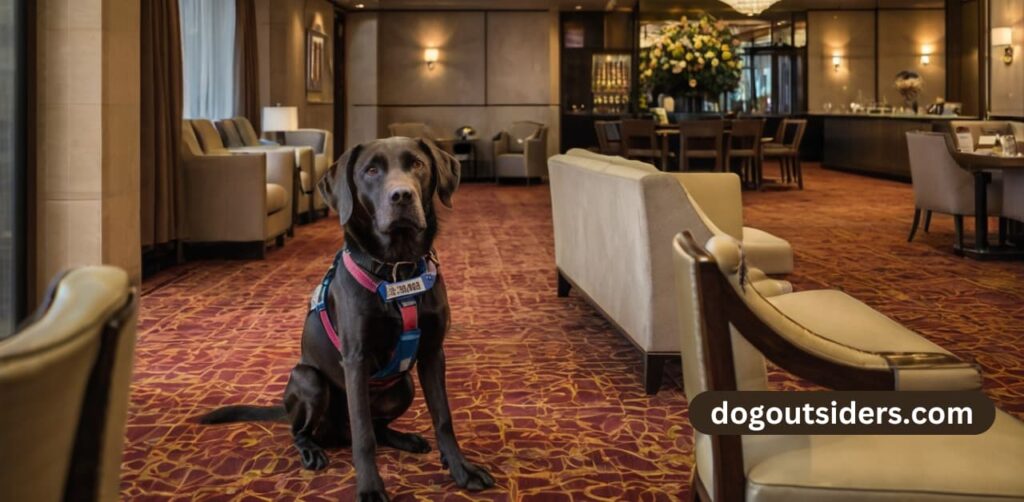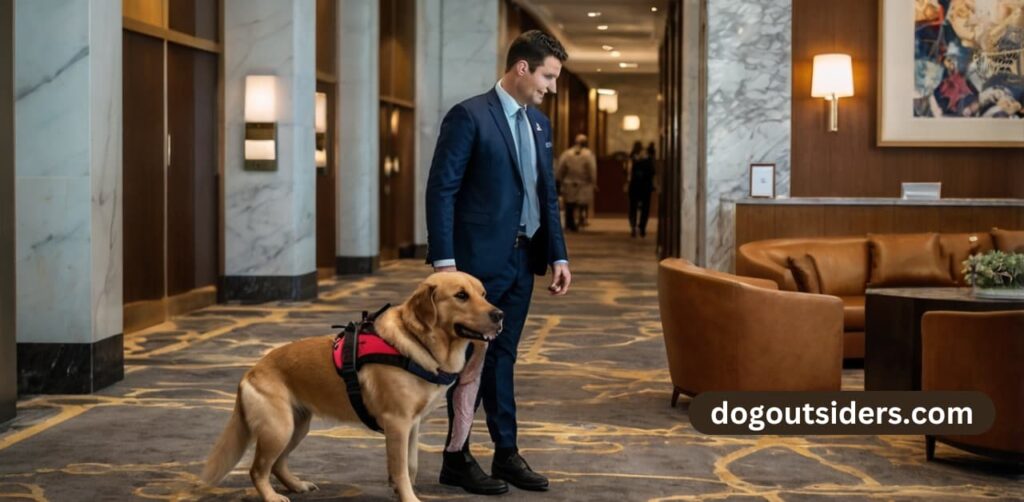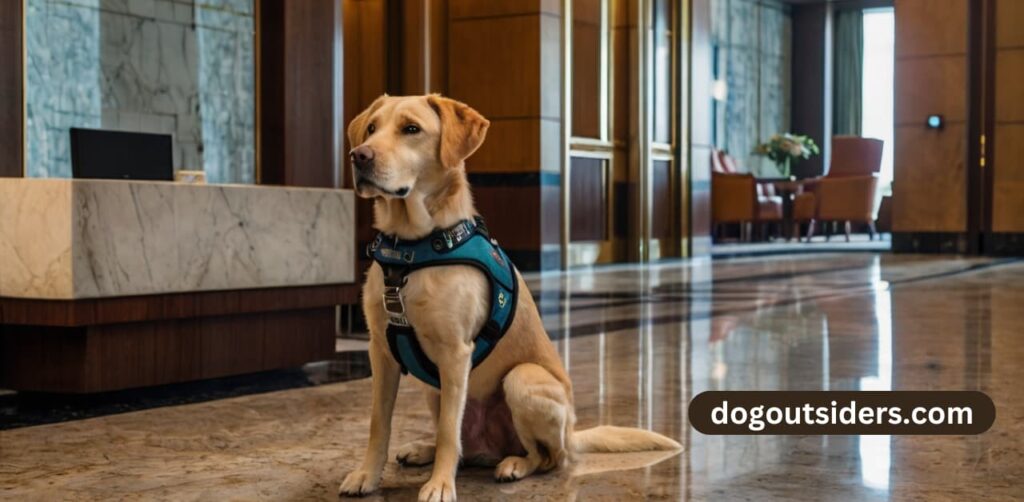Did you know that nearly 20% of people with disabilities use service dogs? This statistic surprised me when I first learned it. Many folks assume hotels must welcome service animals and service dogs access for disabled dog owners, but that’s not always the case. I often wonder, can a hotel refuse a service dog?
The truth is, laws and policies vary. Some hotels may deny access based on their own rules or misunderstandings about what qualifies as a service animal. It’s crucial for travelers to know their rights regarding hotels service dogs, the hotel’s obligations, and the importance of legitimate service dog handlers amidst concerns about service dog fraud and many service dog tasks. In this post, I’ll dive into the details, helping you navigate this important topic. Understanding your rights can make a huge difference in your travel experience.
Key Takeaways
- Hotels must allow service dogs under the ADA, so know your rights and be prepared to assert them if needed.
- Understand the difference between service dogs and emotional support animals, as only service dogs have specific legal protections.
- Familiarize yourself with hotel policies regarding service dogs before booking to avoid surprises during your stay.
- Hotels can ask two specific questions about the service dog: if it is required due to a disability and what tasks it is trained to perform.
- Be aware of common misconceptions, such as thinking all animals are considered service animals; this can help you advocate effectively for your needs.
- When traveling, plan ahead by checking Airbnb policies on service dogs, as they may differ from traditional hotels.
Understanding Service Dog Rights

Service Dog Ownership
Service dogs are not pets. They are trained to assist people with disabilities. Under the Americans with Disabilities Act (ADA), service dog owners have specific rights. These rights allow them access to public spaces, including hotels.
I believe it’s crucial for everyone to understand this distinction. Many people still confuse service dogs with emotional support animals or pets. This misunderstanding can lead to issues when traveling.
Areas of Access
Hotels must allow service dogs in areas where guests are typically permitted. This includes lobbies, restaurants, and guest rooms. However, some areas like kitchens or food preparation zones may restrict access for safety reasons.
Service dog handlers should always confirm their rights with hotel management before arrival. I find that having clear communication helps avoid misunderstandings during check-in.
Responsibilities of Handlers
Service dog owners have responsibilities as well. They must keep their dogs under control at all times. This means leashing the dog or using a harness when necessary.
Handlers should also ensure that their service dogs do not disrupt other guests. If a dog barks excessively or behaves aggressively, staff may ask the handler to leave. It’s important for me to maintain good behavior from my service dog to ensure smooth experiences.
Service Dog Regulations
Service dog regulations vary by state. Some states have additional laws beyond the ADA. For instance, some require service dog certification or identification for easier access in certain places.
Legitimate service dog teams must follow these regulations closely. Misrepresenting a pet as a service animal is considered service dog fraud. This can lead to legal consequences and harm the reputation of real service dogs.
Real Service Dogs
Real service dogs undergo extensive training. They learn specific tasks related to their handler’s disability. These tasks can include guiding visually impaired individuals or alerting deaf owners to sounds.
Understanding what constitutes a legitimate service dog is essential for everyone involved. I often educate others about this topic to help reduce confusion and promote acceptance.
Legal Protections Under the ADA

Scope of the ADA
The Americans with Disabilities Act (ADA) provides legal rights to individuals with disabilities. This law protects service dog handlers in various public spaces, including hotels. Service dogs are defined as animals trained to assist people with disabilities. The ADA covers physical and mental disabilities.
Hotels must allow service dogs, regardless of their pet policies. This means they cannot refuse access based on breed or size. I find it essential to know that this law applies nationwide. It ensures that people with disabilities can travel without fear of discrimination.
Implications for Hotels
Hotels that fail to comply with ADA regulations face serious consequences. They risk losing business from customers who need service dogs. Refusing entry can lead to negative reviews and damage a hotel’s reputation. Moreover, guests may file complaints with government agencies.
A hotel’s failure to accommodate service dogs can result in legal actions. Lawsuits can arise under the ADA, leading to costly settlements. I have seen cases where hotels had to pay damages after denying access. These financial penalties serve as a warning for other establishments.
Consequences of Non-Compliance
Non-compliance with the ADA can have severe repercussions for hotels. Financial penalties can range from fines to legal fees. Courts may award damages to affected individuals, which can be substantial. The Fair Housing Act also plays a role in protecting service animals in housing situations.
Hotels may face investigations by government agencies if complaints arise. Such scrutiny can further harm a hotel’s standing in the community. I believe understanding these consequences is crucial for hotel owners and managers.
Summary of Legal Rights
- Service dogs are protected under the ADA.
- Hotels must allow access regardless of their pet policies.
- Failure to comply can lead to legal actions and financial penalties.
Understanding these access rights is vital for both service dog handlers and hotel management. Knowledge of the law helps prevent misunderstandings and promotes inclusivity.
Hotel Policies and Service Dogs

Hotels Service Dogs
Many hotels have specific service dog policies. These rules differ from general pet policies. Most hotels allow service dogs to accompany their owners. This is because service dogs are not considered pets. They provide essential support to individuals with disabilities.
Hotels may require documentation for service dogs. This can include proof of training or certification. However, the Americans with Disabilities Act (ADA) does not mandate this. I believe it’s crucial for guests to understand these distinctions. Knowing the difference can prevent confusion during check-in.
Hotel Rules
Hotel rules vary widely. Some hotels charge additional fees for pets but not for service dogs. Guests traveling with a service dog should confirm this before booking. Understanding hotel access rules helps ensure a smooth stay. I always recommend calling ahead to clarify any specific policies.
Hotels must clearly communicate their service animal policies. This includes what is expected from guests and their service animals. Signs in the lobby or information on the website can help. Clear communication sets expectations for both parties.
Hotel Staff
Training hotel staff members is vital. Staff should know how to handle inquiries about service dogs confidently. They need to understand the legal protections under the ADA. This ensures compliance with service dog regulations.
Staff training also helps create a welcoming environment for guests with disabilities. Employees should be educated on how to approach situations involving service dogs. My experience shows that well-trained staff can greatly enhance a guest’s stay.
Assistance Animal Accommodations
Hotels must provide reasonable accommodations for assistance animals. This includes allowing access to common areas like restaurants and pools. Guests should feel comfortable knowing their rights when traveling with a service dog.
Many hotels adopt welcoming policies for service animals to prevent any form of discrimination. Guests should communicate any problems they face with their service dogs. Such feedback is vital for enhancing hotel services and ensuring adherence to legal requirements.
Communication Importance
Effective communication between hotels and guests is key. Guests must feel informed about hotel policies related to service dogs. Hotels should provide clear guidelines upon booking or at check-in.
A well-informed guest is less likely to face problems during their stay. Sharing information about potential charges or restrictions in advance prevents misunderstandings.
Allowed Questions
Hotels can ask two specific questions regarding service dogs. First, they may inquire if the dog is a service animal required due to a disability. Second, they can ask what tasks the dog has been trained to perform. These questions help hotels understand the purpose of the service dog without infringing on the handler’s privacy.
I believe it’s essential for hotel staff to be trained in these areas. Understanding their rights and responsibilities helps create a welcoming environment for everyone.
No Extra Documentation
Hotels cannot demand extra documentation or certifications from service dog handlers. The law protects individuals using service animals from unnecessary barriers. This means hotel staff should not request proof of training or health records.
Handlers often face challenges when traveling, so it’s important that hotels respect these guidelines. I’ve seen how stressful it can be for someone to travel with a service dog, only to encounter roadblocks along the way.
Privacy Considerations
Respecting the privacy of service dog handlers is crucial during verification. Hotel staff should focus on the allowed questions without prying into personal details. Handlers have a right to keep their medical information private.
I find that many people misunderstand this aspect of service dogs. They may think asking more questions is acceptable, but it can lead to uncomfortable situations for both parties involved.
Consequences of Misunderstanding
Misunderstandings about these verification questions can lead to complaints or disputes. If hotel staff do not follow the law, they risk facing legal action. Handlers may file complaints against hotels that violate their rights under the Americans with Disabilities Act (ADA).
Awareness of these issues is vital for both hotel staff and guests. It fosters a respectful atmosphere where everyone feels welcome and safe.
Settlement Options
If conflicts arise regarding service dogs, there are settlement options available. Handlers can report violations to local authorities or seek legal counsel. Many organizations provide resources for those facing discrimination related to their service animals.
I encourage anyone who experiences issues to document everything and seek help. Knowledge about your rights can empower you in difficult situations.
Common Misconceptions About Service Animals
Service Dogs Defined
Service dogs are trained to assist people with disabilities. They perform specific tasks that help their handlers. For example, a service dog can guide a person who is blind or alert someone who has seizures. These dogs undergo extensive training to meet the needs of their owners.
I have seen firsthand how a service dog can change someone’s life. Their skills allow individuals to gain independence and confidence. It’s important to understand that not every dog can serve this purpose.
Emotional Support vs. Service Dogs
Many people confuse emotional support animals with service dogs. Emotional support animals provide comfort but do not have specialized training. They do not perform specific tasks related to a disability. This distinction is crucial when discussing service animals in public places like hotels.
Hotels must recognize the difference between these two types of animals. Only trained service dogs have legal rights under the Americans with Disabilities Act (ADA). Emotional support animals do not enjoy the same protections in public accommodations.
Training Requirements
Another common misconception is that any dog can be classified as a service animal. This is false. Service dogs require proper training to perform their tasks effectively. Without this training, a dog cannot be considered a service animal under the law.
I often hear stories about people claiming their pets as service animals. This leads to confusion and frustration for businesses and those with legitimate needs. Hotels may ask questions to verify if the dog is indeed a service animal, which is allowed by law.
Legal Recognition Differences
The legal recognition of service dogs differs from therapy animals. Therapy animals are not covered under the ADA. They provide comfort in settings like hospitals or schools but lack the same legal access rights as service dogs.
Service dogs have specific tasks they perform for their handler’s disability. Therapy animals do not have this requirement. Understanding this difference helps clarify what rights each type of animal has.
Emotional Support Animals vs. Service Dogs
Definitions
Service dogs and emotional support animals (ESAs) serve different purposes. Service dogs undergo specific training to assist individuals with disabilities. They perform tasks that help their handlers navigate daily life. In contrast, ESAs provide comfort but do not have specialized training for tasks.
I learned that ESAs can be pets or even therapy animals. They offer emotional support but lack the legal status of service animals. This distinction is crucial when discussing rights in public spaces.
Legal Status
The legal framework surrounding these two types of animals differs widely. Under the Americans with Disabilities Act (ADA), only service dogs are granted access to public accommodations. This includes hotels, restaurants, and stores. Emotional support animals do not enjoy the same rights under this law.
Many people mistakenly believe that ESAs have the same privileges as service dogs. In reality, businesses can refuse entry to emotional support animals. They are not recognized as service animals under federal law.
Training and Tasks
Service dogs are trained to perform specific tasks related to their handler’s disability. For example, they can guide individuals who are visually impaired or alert those who are deaf. Some service dogs assist veterans with PTSD by providing comfort during anxiety attacks.
Emotional support animals do not perform these specific tasks. Their role is to provide companionship and comfort but lacks the functional aspect of service dogs. I often see people confused about this difference.
Examples of Tasks
Here are some common tasks that service dogs may perform:
- Guiding visually impaired individuals.
- Alerting deaf handlers to sounds.
- Reminding handlers to take medication.
- Providing stability for those with mobility issues.
- Interrupting harmful behaviors in psychiatric conditions.
These tasks highlight the functional capabilities of service dogs compared to emotional support animals.
ADA Violations by Hotels
Common Violations
Hotels often commit ADA violations regarding service dogs. One common issue is charging extra fees for service animals. The law states that hotels cannot impose additional charges for service dogs. Another violation occurs when hotels deny access to a guest with a service dog based on breed or size. Service dogs can be of any breed, and their size does not determine their ability to assist.
Hotels sometimes neglect to offer appropriate accommodations for guests with service dogs. For instance, they may create restricted areas where these assistance animals are not permitted. Such limitations infringe upon the rights of individuals who depend on their service dogs. There have been cases where hotel staff, unfamiliar with ADA regulations, have denied entry to guests needing these vital companions.
Impact on Guests
These violations significantly impact guests with disabilities. They may face emotional distress when denied access to a hotel. Many people rely on their service dogs for daily support and independence. When hotels refuse entry, it undermines their rights and creates barriers.
In some cases, guests may feel forced to find alternative lodging. This situation can lead to increased stress and anxiety during travel. I remember hearing stories from friends who struggled to find pet-friendly accommodations simply because they had a service animal. Their experiences highlight how vital it is for hotels to comply with ADA rules.
Recent Cases
Recent legal cases illustrate the consequences of non-compliance with ADA regulations. In 2021, a hotel in California faced fines after refusing service to a guest with a legitimate service dog. The guest filed a complaint, leading to an investigation by the Department of Justice. The hotel was required to pay fines and implement training for its staff on ADA compliance.
Another notable case involved a hotel chain that settled with a family in 2020. They had denied access to their service dog, causing considerable distress. The settlement included financial compensation and mandatory training for all employees regarding service animal policies.
These cases serve as reminders of the importance of understanding and respecting the rights of individuals with disabilities. Hotels must ensure that their policies align with the ADA guidelines. Failure to do so can lead to serious repercussions and harm those who depend on their service animals.
Staying at Airbnbs With Service Dogs
Airbnb Policies
Airbnb hosts set their own rules regarding service dogs. Some may welcome them, while others might not. This flexibility can lead to confusion. Unlike hotels, which must follow the Americans with Disabilities Act (ADA), Airbnb hosts have more leeway. They can choose whether to accept service animals based on their personal policies.
I remember booking an Airbnb for a trip once. I made sure to read the host’s rules carefully. It helped me understand their stance on pets and service animals.
Communication is Key
Before booking, communicate with your host about bringing a service dog. Clear communication helps avoid misunderstandings. Many hosts appreciate knowing in advance that you will have a service animal. It allows them to prepare for your stay and make necessary adjustments.
Reaching out also gives you a chance to explain your dog’s role. This can reassure the host and ease any concerns they may have.
Challenges and Solutions
Booking an Airbnb with a service dog can present challenges. Some hosts may not fully understand ADA guidelines. They may mistakenly treat service dogs like regular pets. This misunderstanding can lead to refusal of accommodation.
To tackle these issues, gather documentation about your service dog. Having proof of training or certification can help clarify your situation. If a host denies your request, consider looking for other options.
You can also check listings that specifically mention acceptance of service animals. Many hosts are open to accommodating guests with service dogs, but it’s best to confirm first.
Finding the Right Stay
Look for listings that highlight pet-friendly policies. These often indicate a willingness to accept service animals as well. Using search filters on Airbnb can save time and reduce stress when finding suitable accommodations.
In my experience, filtering results helped me find places that were welcoming to my needs. It made the process smoother and more enjoyable.
Tips for Traveling with Service Dogs

Documentation Needed
Traveling with a service dog requires careful preparation. Obtain necessary documentation before your trip. This includes proof of your dog’s training and certification as a service animal. I always carry my dog’s identification and any relevant paperwork. This helps in case I need to show it at hotels or other accommodations.
Hotels have the right to ask for certain information regarding service dogs, which can help streamline the check-in process. It’s important to note that the Americans with Disabilities Act (ADA) specifically defines service animals as dogs that have been trained to assist individuals with disabilities. These trained tasks may include guiding those who are visually impaired, alerting people to sounds, or offering help during medical emergencies.
Smooth Hotel Stays
To ensure a smooth experience at hotels, notify them in advance about your accompanying service animal. Some establishments have specific policies regarding service dogs. Confirm their rules when making reservations.
I find that calling ahead helps clarify any questions I might have. It also gives the hotel staff time to prepare for my arrival. Upon check-in, remind the staff that your dog is a service animal, not just a pet. This distinction is important under the law.
Public Interactions
Managing public interactions can be challenging while traveling with a service dog. Some people may approach you with questions or comments about your dog. Stay calm and respond politely. Explain that your dog is trained to assist you.
I often remind myself that not everyone understands the role of a service canine care. Avoid engaging in lengthy discussions if you feel uncomfortable. Focus on your needs and those of your dog instead.
Strategies for Travel Success
Use these strategies for successful travel:
- Plan routes that are pet-friendly.
- Schedule breaks for both you and your dog.
- Bring familiar items like toys or blankets to help your dog feel secure.
These steps can ease anxiety for both of you during the journey. I always pack extra supplies, including food and water bowls, to keep my dog comfortable.
Conclusion:
Navigating hotel policies regarding service dogs can be tricky. I’ve shared essential insights on rights, legal protections, and common misconceptions. Understanding these aspects empowers me to advocate for myself and my service dog. Hotels must comply with ADA regulations, ensuring we have access to accommodations without hassle.
I encourage you to stay informed about your rights and speak up if you face discrimination. Knowledge is power! Whether I’m traveling or planning a getaway, being prepared makes all the difference. Let’s make travel accessible for everyone. Share this info with fellow travelers and help spread awareness. Together, we can create a more inclusive environment for service dog teams everywhere.
Frequently Asked Questions
No, hotels cannot refuse access to service dogs under the Americans with Disabilities Act (ADA). They must accommodate guests with legitimate service animals.
Service dogs are protected under the ADA, which mandates that public accommodations, including hotels, allow them. This includes providing necessary access and services.
Hotels can ask if the dog is a service animal required due to a disability and what tasks the dog has been trained to perform. They cannot ask for documentation.
No, emotional support animals do not qualify as service dogs under the ADA. Only dogs trained to perform specific tasks for individuals with disabilities are recognized.
Document the incident and speak to hotel management. If unresolved, file a complaint with the Department of Justice or seek legal counsel for potential ADA violations.
Yes, you can bring your service dog to an Airbnb. Hosts must comply with ADA regulations, but it’s best to confirm their pet policy beforehand.
Always inform your accommodations in advance, carry identification if available, and ensure your dog is well-behaved. Familiarize yourself with local laws regarding service animals.






